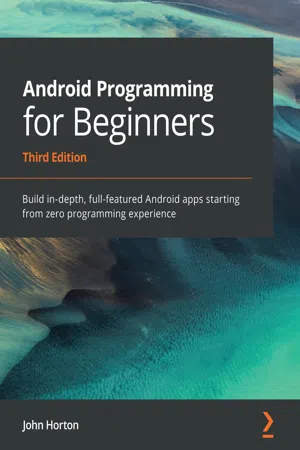
Android Programming for Beginners
Build in-depth, full-featured Android apps starting from zero programming experience, 3rd Edition
John Horton
- 742 pagine
- English
- ePUB (disponibile sull'app)
- Disponibile su iOS e Android
Android Programming for Beginners
Build in-depth, full-featured Android apps starting from zero programming experience, 3rd Edition
John Horton
Informazioni sul libro
Learn the Java and Android skills you need to start developing powerful mobile applications with the help of actionable steps
Key Features
- Kick-start your Android programming career or just have fun publishing apps to the Google Play marketplace
- Get a first principles introduction to using Java and Android and prepare to start building your own apps from scratch
- Learn by example by building four real-world apps and dozens of mini apps
Book Description
Do you want to make a career in programming but don't know where to start? Do you have a great idea for an app but don't know how to make it a reality? Or are you worried that you'll have to learn Java programming to become an Android developer? Look no further! This new and expanded third edition of Android Programming for Beginners will be your guide to creating Android applications from scratch.
The book starts by introducing you to all the fundamental concepts of programming in an Android context, from the basics of Java to working with the Android API. You'll learn with the help of examples that use up-to-date API classes and are created within Android Studio, the official Android development environment that helps supercharge your mobile application development process. After a crash course on the key programming concepts, you'll explore Android programming and get to grips with creating applications with a professional-standard UI using fragments and storing user data with SQLite. This Android Java book also shows you how you can make your apps multilingual, draw on the screen with a finger, and work with graphics, sound, and animations.
By the end of this Android programming book, you'll be ready to start building your own custom applications in Android and Java.
What you will learn
- Understand the fundamentals of coding in Java for Android
- Install and set up your Android development environment
- Build functional user interfaces with the Android Studio visual designer
- Add user interaction, data captures, sound, and animation to your apps
- Manage your apps' data using the built-in Android SQLite database
- Explore the design patterns used by professionals to build top-grade applications
- Build real-world Android applications that you can deploy to the Google Play marketplace
Who this book is for
This Android book is for you if you are completely new to Java, Android, or programming and want to get started with Android app development. If you have experience of using Java on Android, this book will serve as a refresher to help you advance your knowledge and make progress through the early projects covered in the book.
Domande frequenti
Informazioni
Chapter 1: Beginning Android and Java
- Discovered what is new in this third edition
- Learned how Java and Android work together
- Set up our development environment – Android Studio – which takes care of all the components involved in building the Android apps that we will learn about next
- Learned about the Java Development Kit (JDK) and the Android Application Programming Interface (API) and how we use them through Android Studio
- Built our very first Android app
- Deployed the app on an Android emulator
- Run our app on an Android emulator and a real device
Technical requirements
- Microsoft® Windows® 7/8/10 (64-bit)
- 4 GB RAM as a minimum; 8 GB RAM recommended
- 2 GB of available disk space as a minimum; 4 GB recommended (500 MB for the Integrated Development Environment (IDE) + 1.5 GB for the Android Software Development Kit (SDK) and emulator system image)
- 1,280 x 800 minimum screen resolution
- Mac® OS X® 10.10 (Yosemite) or higher, up to 10.14 (macOS Mojave)
- 4 GB RAM as a minimum; 8 GB RAM recommended
- 2 GB of available disk space as a minimum; 4 GB recommended (500 MB for the IDE + 1.5 GB for the Android SDK and emulator system image)
- 1,280 x 800 minimum screen resolution
- GNOME or KDE desktop
- Tested on gLinux based on Debian
- 64-bit distribution capable of running 32-bit applications
- GNU C Library (glibc) 2.19 or later
- 4 GB RAM as a minimum; 8 GB RAM recommended
- 2 GB of available disk space as a minimum; 4 GB recommended (500 MB for the IDE + 1.5 GB for the Android SDK and emulator system image)
- 1,280 x 800 minimum screen resolution